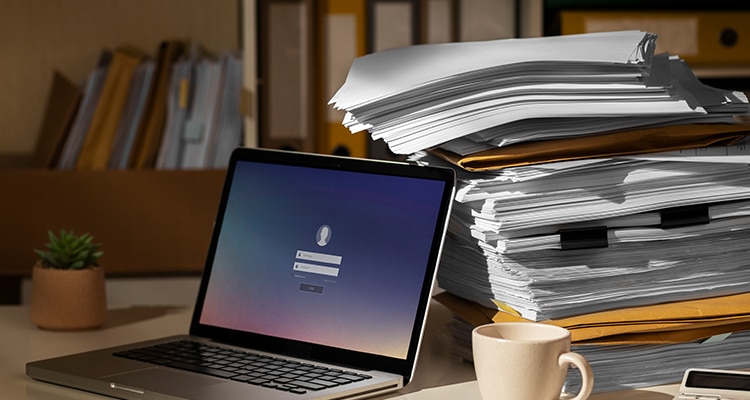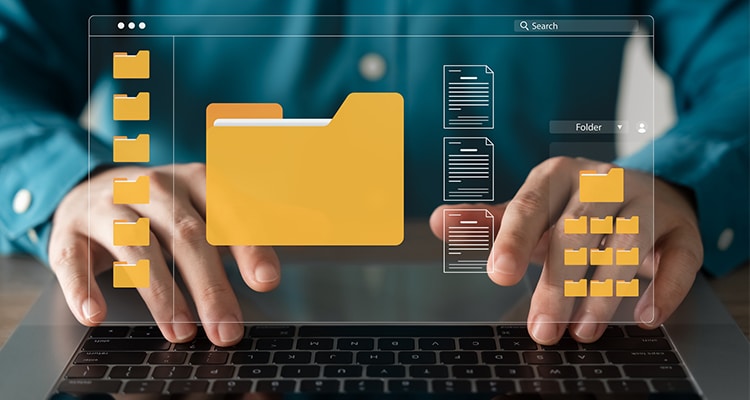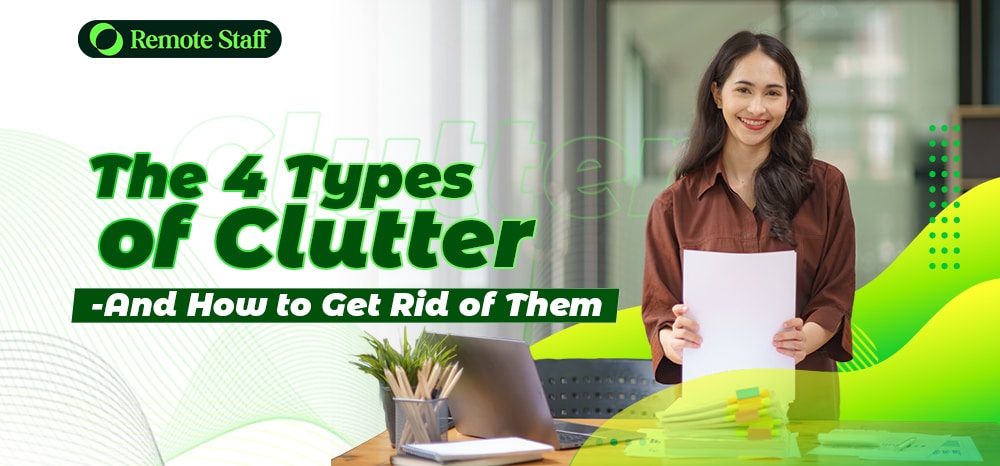When we think of clutter, the first thing that comes to mind is a messy stack of items.
While this is partly true, it’s not the entire picture.
Besides physical clutter, there are three other types of clutter that are detrimental to your productivity and health. These are digital, emotional, and spiritual clutter.
Often, physical and digital clutter are signs of emotional and spiritual clutter. That is why some people struggle to declutter their rooms or workspaces.
To help you overcome the four types of clutter, let’s take a deeper look at each of them and how they affect you, along with some decluttering tips.

Physical Clutter
Let’s start with the most basic type of clutter.
Physical clutter piles up when you hoard items or don’t place them back in their proper place, which gives a sense of disorder.
Examples include used clothes on your bedroom floor, books lying messily on your bedside table, and piles of opened and unopened mail.
Negative Effects
Physical clutter drastically lowers productivity since it makes you spend extra time looking for the stuff you need. This delay can also cause frustration, further hampering your ability to think well while working on your work from home job.
Additionally, messy rooms can make us feel guilty when we’re enjoying our hobbies or relaxing in our rooms instead of cleaning.
Decluttering Tips
Here are some tips to help you overcome physical clutter:
- Start small by clearing your drawers, tables, or bed, then move on to the rest of your room.
- Use the 4-box method: Take 4 boxes and label each as “keep,” “sell/donate,” “trash,” and “relocate.” As you go about your room, place each item in the appropriate box.
- Establish and maintain a regular decluttering schedule.
- Consider the one-in, one-out rule: For every new item you buy, get rid of or give away another time to minimize clutter.

Digital Clutter
Our gadgets have become a crucial part of our lives.
However, this also means we’ve accumulated plenty of unnecessary stuff in our gadgets at any given time. These are called digital clutter.
Examples include unused programs, unopened emails, and disorganized pictures and videos on your computer/laptop or smartphone.
With the advent of social media, you can also add following too many people and being in too many Facebook groups to the list.
Negative Effects
Just like with physical clutter, having too many items on your computer makes it difficult to find the files or images you need quickly and efficiently. Digital clutter can also slow down your computer’s performance.
Additionally, constant exposure to other people’s lives (or rather, the part of their lives they want you to see) on social media can make us feel insecure about our own.
Decluttering Tips
Here are tips to clear your gadgets of clutter:
- Organize all essential files, images, and videos in specific folders.
- Archive important emails and delete spam or ads.
- Regularly clean up or delete unnecessary files and apps.
- Limit the people you follow on social media to close friends and family.

Emotional Clutter
Unresolved emotions, thoughts, and other mental burdens can also clog our minds and prevent us from achieving happiness or doom us to repeating unhealthy patterns.
Negative Effects
Emotional clutter affects every aspect of your life, from personal health and careers to how you behave in relationships.
Emotional clutter increases stress and anxiety. It also impairs your ability to focus and make proper decisions.
Emotional clutter also makes it difficult for you to love yourself, hampering your ability to form healthy relationships.
Decluttering Tips
Overcoming emotional clutter isn’t easy since it involves acknowledging painful memories and moving forward from them.
However, there are ways to help you do so:
- Practice mindfulness and self-awareness: engaging in meditation, deep breathing exercises, and yoga can help you become more in tune with your emotions without judgment.
- Engage in self-compassion: When dealing with difficult emotions, being kind to yourself increases your resilience and promotes emotional healing. This can involve getting enough sleep, giving yourself positive affirmations and taking a much-deserved break from work.
- Seek appropriate support: You don’t have to overcome your emotional clutter alone. Talking to your loved ones or a mental health professional can provide perspective, validation, and encouragement as you resolve your personal issues.

Spiritual Clutter
These hinder your spiritual growth and alignment.
They’re not just limited to religious beliefs – they can also refer to your search for meaning and purpose in your life.
Examples include a sense of unfulfillment in your job, a lack of purpose, and resistance to change.
Negative Effects
Spiritual clutter greatly hinders your ability to find purpose and meaning in your life, which leads to internal turmoil and confusion about what you should be doing.
These stunt your personal and career growth and can make you feel like you’re losing your identity.
Decluttering Tips
Here are some tips on how to overcome the effects of spiritual clutter in your life:
- Take some time to assess your beliefs, values, and future goals.
- Cultivate gratitude for the many blessings you’ve received in your life.
- Seek the help of your loved ones or professionals if necessary.

Time for Some Spring Cleaning!
The most challenging part of decluttering is always the first step.
However, by knowing more about the four types of clutter, you’ll be able to deal with them better.
Still looking for work from home jobs? Don’t worry. Remote Staff is here to help.
Looking for online transcription jobs? What about online design jobs?
Our jobs list contains plenty of positions for you to choose from.
So, what are you waiting for? Sign up here. Good luck!

